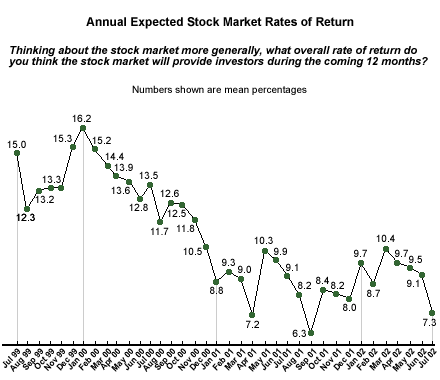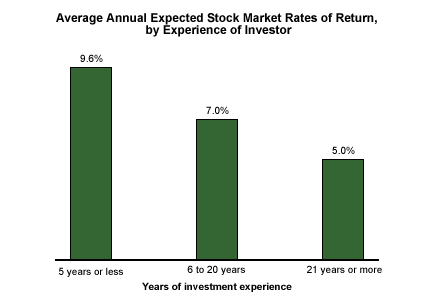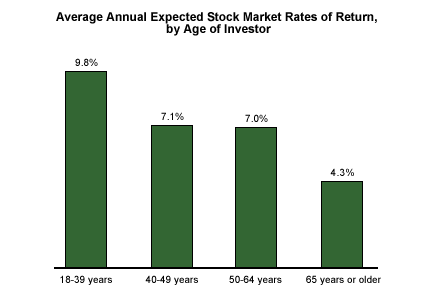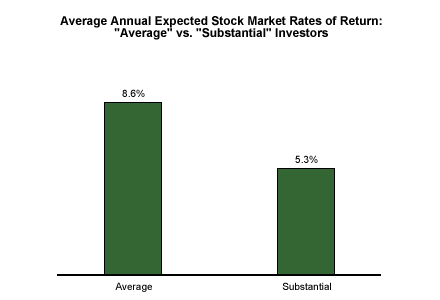Last week, the Bush administration continued talking up the economy by forecasting economic growth of 3% or more during the second half of 2002. The Fed left interest rates unchanged, but unlike the administration, acknowledged the increasing risk of economic weakness in the months ahead. Initially, the stock market responded badly to the Fed's decision, but the Dow ended the week up for the fourth time in a row.
It appears that the equity markets are now resisting bad news while continuing to rise. The talk on Wall Street is that many investors are now afraid of missing the market bottom. Of course, getting in at the bottom holds the potential for huge investor gains over the remainder of this year and beyond.
Although I understand the urge to be part of the tremendous gains that might be garnered as the market turns, I think the risks of investing more in equities now outweigh the potential rewards for most investors. For one thing, most investors aren't expecting to get huge rates of return over the next year. According to the Gallup/UBS Index of Investor Optimism's July survey*, investors expect the stock market to provide an annual rate of return of about 7% over the next 12 months. Significantly, wealthier and more experienced investors expect an even lower annual rate of return of only about 5% over the next year.
How much risk of loss is it reasonable to assume in order to get a 5% to 7% annual benefit? In my view, far less than the risk of capital loss currently present in the economy. Bankruptcies hit a record high for the year last week when US Airways filed for Chapter 11. Many major U.S. companies -- not to mention many small businesses -- are facing a credit crunch as bankers and investors have become much less willing to lend. Add to this the growing likelihood that consumers will reduce spending, and you wind up with a scenario that could produce significant and immediate capital/net worth losses in the equities markets.
Investor Expectations Have Declined
Investors say they have gotten an overall annual rate of return of 2.5% on their portfolios over the past 12 months, compared to the 4.9% that they claimed in July 2001 and the double-digit returns they claimed in 1999 and 2000. This is similar to the return they would have gotten on a bank CD over the past year -- but very different in terms of principal risk, as the many investors experiencing substantial losses on their equity investments can attest.
Over the next 12 months, investors expect the stock market to provide an annual average rate of return of 7.3% -- the lowest rate of return investors have anticipated since the 6.3% of September 2001. Still, many investors have remained fairly optimistic about the market over the past couple of years, even as they have watched the returns on their portfolios plummet. In July 2001, investors said the stock market would provide them with an annual average rate of return of 9.1% over the next 12 months. In both 1999 and 2000, investors anticipated double-digit gains.

More Experienced Investors Expect Less
The more investment experience investors have, the lower the rate of return they expect the markets to provide over the next year. Investors with five or fewer years of investment experience say they expect the stock market to provide an annual average rate of return of 9.6% over the next 12 months. Investors with six to 20 years of experience expect a return of 7% over the next 12 months. Those with more than 20 years experience expect a 5% annual average rate of return.

Older Investors Expect Less
Since age and investing experience are highly interrelated, expected returns also differ by investor age. Younger investors (aged 18 to 39) expect the stock market to provide an annual average rate of return of 9.8% over the next 12 months, compared to 7% for investors aged 40 to 64 and 4.3% for investors 65 and older.

Substantial Investors Expect Less
Most importantly, rate-of-return expectations differ among average and substantial investors. Substantial investors -- those with investable assets of $100,000 or more -- expect the stock market to provide an annual average rate of return of only 5.3% over the next 12 months. In sharp contrast, average investors expect an annual average rate of return of 8.6%. It appears as though the more money investors have, the lower the rate of return they expect the markets to provide over the next year.

Key Points
The U.S. economy will be entering a new phase in the months ahead as the credit squeeze forces more corporate bankruptcies. This suggests that equity investors will be placing their capital at significant risk. Younger investors who expect high returns and have a higher risk tolerance may see a reasonable risk-return ratio from equities right now. Similarly, wealthier investors who see big potential gains in selected stocks may also see reasonable risks in equities. However, most investors -- particularly those who expect annual rates of return of 5% or lower -- might be well advised to sit out the next few months. Money market and CD returns may seem awfully low, but a capital preservation strategy -- outside the equities market -- has many potential benefits in this kind of economy.
*Results for the Gallup/UBS Index of Investor Optimism -- U.S. are based on telephone interviews with a randomly selected U.S. sample of 1,002 adult investors, aged 18 and older, with at least $10,000 of investable assets, conducted July 1-14, 2002. For results based on the total sample of 1,000, one can say with 95% confidence that the maximum margin of sampling error is ±3%. For substantial investor results based on the total sample of 400, one can say with 95% confidence that the maximum margin of sampling error is ±5%.

